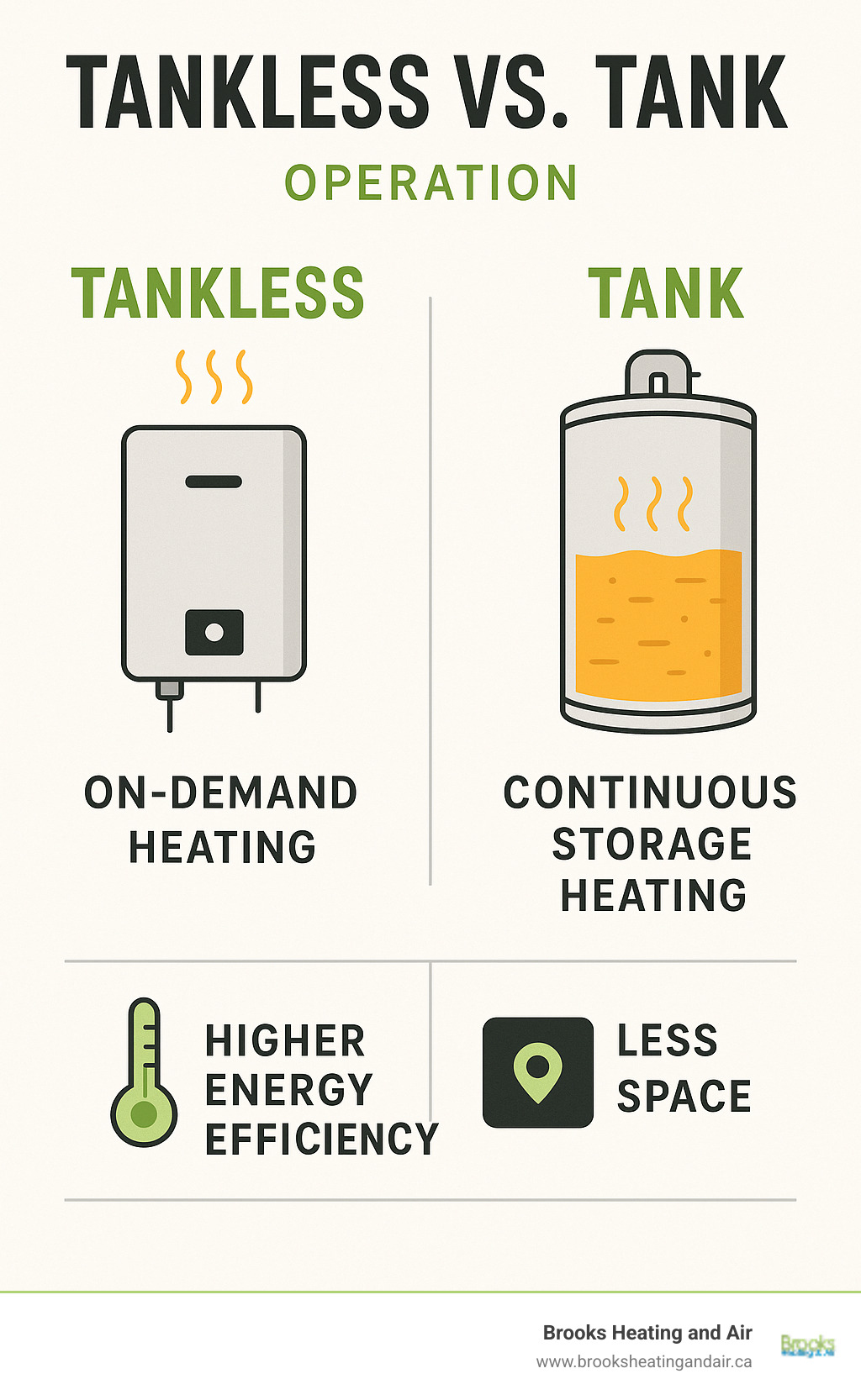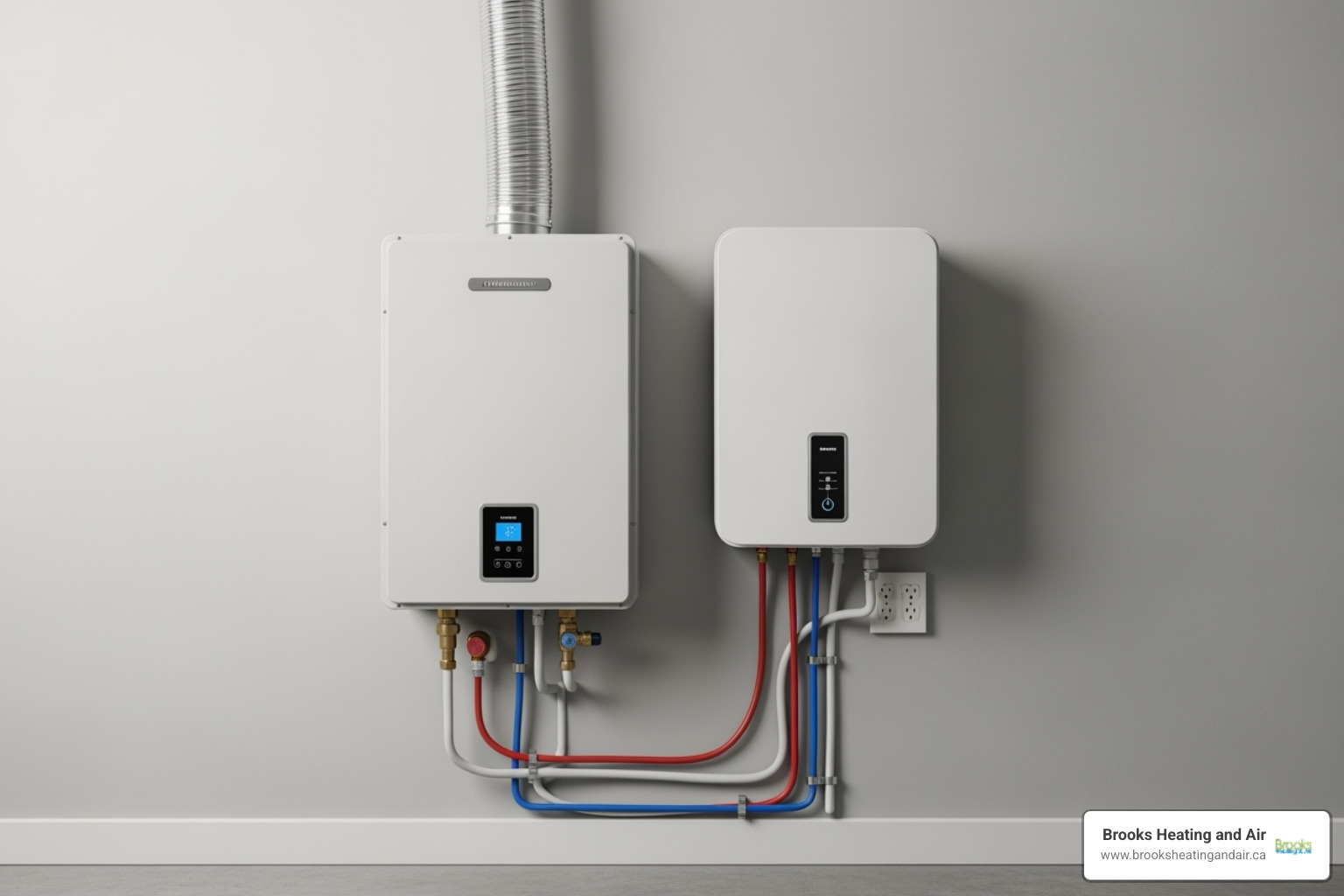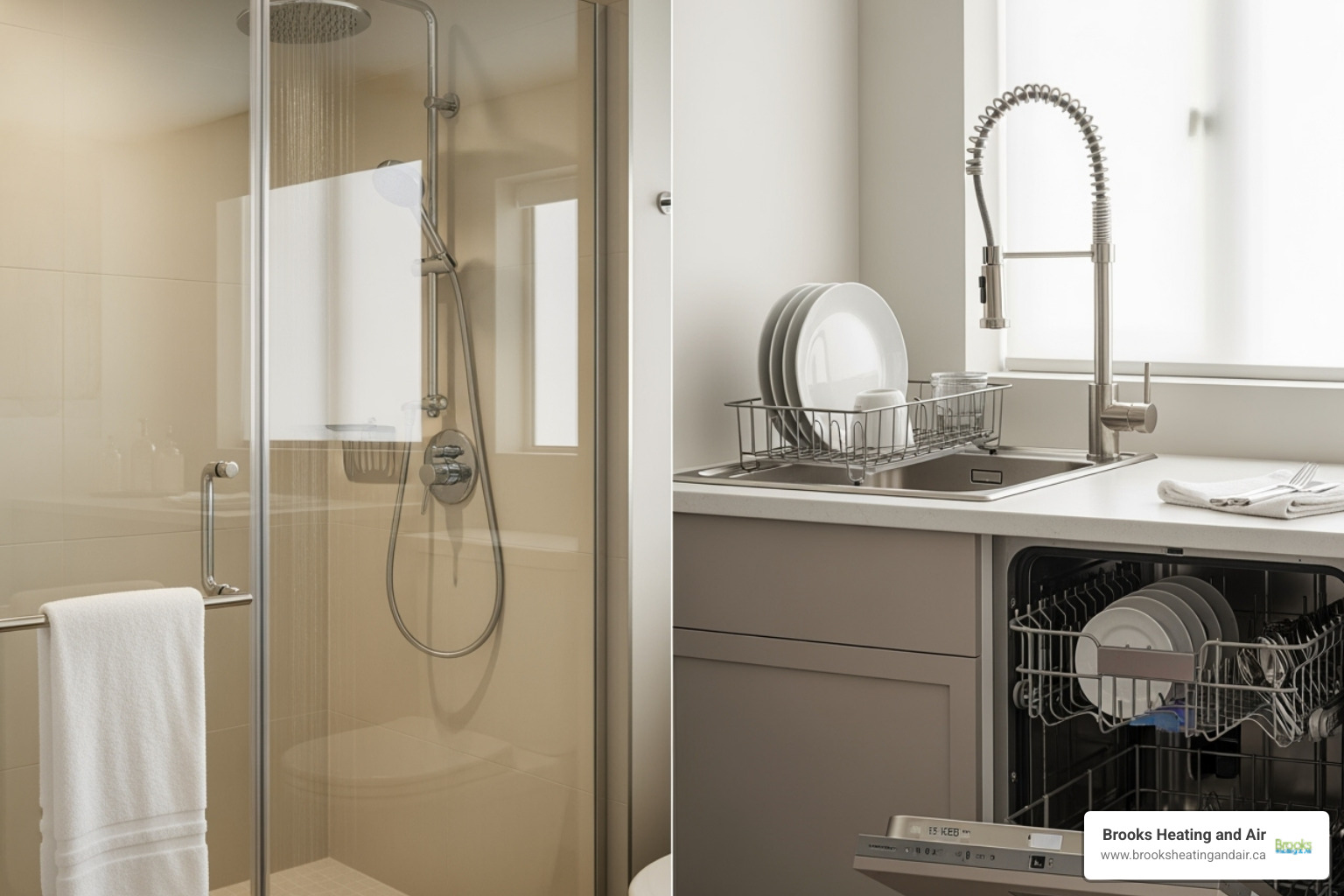Get More Bang for Your Buck: Top Value Water Heaters Reviewed
Why Tankless Water Heaters Are Revolutionizing Canadian Homes
The best tankless water heater delivers endless hot water while slashing your energy bills by up to 30%. Here's what you need to know:
Top Tankless Water Heater Benefits:
- Endless Hot Water - No more cold showers or waiting between uses
- Energy Savings - Up to 30% lower utility bills compared to tank models
- Space Saving - Wall-mounted units free up valuable floor space
- Longer Lifespan - 20+ years vs. 8-12 years for traditional tanks
- On-Demand Heating - Water heated only when you need it
Best Options by Fuel Type:
- Gas/Propane: Higher flow rates, faster heating, lower operating costs
- Electric: Simpler installation, no venting required, lower upfront cost
Traditional tank water heaters are the second-highest energy users in your home, constantly heating and reheating water whether you use it or not. Tankless units eliminate this waste by heating water instantly as it flows through the system.
For Canadian homeowners, tankless heaters offer a practical solution to our climate challenges. Cold groundwater means your system works harder, but modern tankless units are designed to handle temperature rises of 70+ degrees efficiently.
The key is choosing the right size and fuel type for your home's specific needs. A properly sized unit ensures you'll never run out of hot water, even during peak usage times like morning showers or evening dishwashing.

The On-Demand Difference: How Tankless Heaters Work & Key Advantages
Imagine turning on your tap on a chilly Canadian morning and getting instant hot water. That's the magic of the best tankless water heater technology.
When you turn on a hot water tap, a flow sensor activates a powerful gas burner or electric element. Water passes through a heat exchanger, is instantly warmed to your set temperature, and flows directly to your faucet. The key benefit is eliminating standby loss—the energy wasted when traditional tanks constantly heat water, even when you're not using it.
This on-demand approach makes tankless units incredibly energy efficient, saving you up to 30% on energy bills compared to tank heaters—a significant annual saving for Canadian families. The space-saving benefits are also a major plus, as these compact units mount on your wall to free up valuable floor space.
The lifespan is also impressive. A well-maintained tankless unit can last 20+ years, compared to 8-12 years for traditional tanks. Plus, with a properly sized system, you get continuous hot water. The unit heats water on demand, so you'll never run out.
Why Make the Switch?

Switching to tankless is about more than saving money; it's about improving your daily life with hot water.
- No more waiting: Everyone gets perfectly heated water on demand, which is a game-changer for large families who no longer need to schedule showers.
- Reduced flood risk: Since tankless units don't store water, the risk of a tank bursting and flooding your basement is eliminated.
- Increased home value: The modern technology and energy efficiency of a tankless heater can boost your home's value.
- Consistent temperatures: You'll enjoy consistent temperatures without the sudden cold blasts common with tank heaters.
For Canadian homeowners, these advantages make tankless technology especially appealing. The investment pays off in comfort, efficiency, and long-term reliability.
Your Ultimate Buyer's Guide to the Best Tankless Water Heater
Choosing the best tankless water heater depends on your home, your needs, and our Canadian climate. A unit that works in a warm climate might struggle with our colder groundwater, so it's crucial to make an informed choice. When comparing models, look for quality certifications. Water heaters that have earned certification by the Energy Star energy-efficient appliance program are your best bet for long-term savings, as they assure the unit will deliver on its efficiency promises.
Fuel Type: Electric vs. Gas Heaters
Your first big decision is choosing between electric and gas power.

Electric tankless heaters typically cost less upfront and are easier to install since they don't require venting. However, their high power demand (at least 120 amps) often requires a costly electrical panel upgrade. They also have lower flow rates and higher operating costs, making them best for smaller homes or point-of-use applications.
Gas and propane tankless heaters are powerhouses, delivering higher flow rates and faster heating ideal for busy households. The trade-off is a higher upfront cost and more complex installation, as they require proper venting systems and a gas line. However, this investment pays off in superior performance and lower long-term operating costs.
Efficiency Showdown: Condensing vs. Non-Condensing
Next, you'll choose between condensing and non-condensing technology, which affects your unit's energy efficiency.
Condensing heaters are the most efficient, with ratings above 90% UEF. They recycle heat from exhaust gases to pre-warm incoming water, resulting in lower emissions and superior energy savings. While they cost more upfront, they offer the best long-term value in Canada.
Non-condensing heaters are less expensive but also less efficient, as they don't capture heat from the exhaust. They require special high-temperature venting materials because their exhaust is much hotter.
Sizing for Your Home: The Best Tankless Water Heater Capacity
Sizing is about matching the heater's capacity to your family's hot water usage to ensure comfort without overspending.

- Flow Rate (GPM): This is how much hot water a unit can deliver. Calculate your peak demand by adding the GPM of fixtures you might use at once (e.g., a shower at 2.5 GPM and a dishwasher at 1.5 GPM requires a 4 GPM unit). Most residential units deliver 2 to 5 GPM.
- Power (BTU): This determines how quickly water is heated. Homes typically need between 140,000 and 380,000 BTUs, depending on demand.
- Temperature Rise: The Canadian climate is a key factor. The temperature rise needed is greater here due to colder groundwater. A heater that provides 5 GPM in a warm climate might only manage 3 GPM in an Ontario winter, so you need a more powerful unit to achieve the same flow rate.
Accurately calculating your peak demand is crucial for selecting the right-sized unit.
Installation & Maintenance: A Practical Guide for Canadian Homeowners
You've found the best tankless water heater for your home – now what? While that shiny new unit might look simple enough to install yourself, tankless water heaters are complex appliances that demand both plumbing and electrical expertise. Think of it like performing surgery: you could watch a YouTube video, but you really want a professional handling the scalpel!
Most manufacturers actually require proof of professional installation to honor their warranty. Given the complexity involved and the potential safety risks, we always recommend having a qualified technician handle the installation. Trust us – it's worth every penny for the peace of mind alone.
Installation Considerations
The beauty of tankless units is their flexibility. These compact powerhouses can fit in places where traditional tank heaters simply can't. But choosing the right spot involves more than just finding available wall space.
Indoor units are the go-to choice for most Canadian homeowners, and for good reason. They're protected from our harsh winters and can be tucked away in utility rooms, basements, or garages. Gas models need proper ventilation piping to safely exhaust combustion gases – no shortcuts here! Condensing models also need a drain for the water they produce during operation.
Outdoor units might sound crazy given our climate, but they're actually a viable option when you choose units specifically designed for exterior installation. The big advantage? No indoor venting required, which can simplify installation considerably. However, these units must have robust freeze protection built in. Even then, we often recommend draining outdoor units during extended freezing periods if they're not in continuous use – better safe than sorry when it comes to Canadian winters!
Now, here's where things can get interesting (and potentially expensive). Your home might need some upgrades to support your new tankless unit:
Gas line upgrades are common because tankless heaters are hungry for fuel. They need a much higher gas volume than traditional tank heaters, often requiring a larger gas line to meet their BTU demands. Electrical system upgrades are especially important for electric models, which typically need a dedicated 220V circuit and appropriate wiring. If your electrical panel isn't up to the task, you're looking at a significant upgrade. Venting requirements for gas models are also crucial – these specialized venting systems are different from traditional water heater vents and absolutely essential for safety.
This is exactly why professional installation makes sense. Our team at Brooks Heating and Air handles all these considerations seamlessly, ensuring your Tankless Water Heater Installation Georgetown ON meets all safety codes and manufacturer requirements.
Essential Long-Term Maintenance
Here's the secret to getting those promised 20+ years from your tankless water heater: treat it well, and it'll treat you well in return. Regular maintenance isn't just recommended – it's essential for peak performance and longevity.
The star of the maintenance show is descaling (also called flushing the system). This process removes mineral buildup that accumulates inside the heat exchanger over time. Think of it like removing plaque from your teeth – ignore it, and you'll have problems down the road.
Water hardness plays a huge role in how often you'll need to descale. In areas with very hard water, mineral buildup happens faster and can seriously impact your unit's efficiency. We recommend annual descaling for most homes, but if you have particularly hard water or consistently run your heater at high temperatures, every six months is better. Many homeowners successfully use vinegar solutions for this process.
Beyond descaling, your tankless heater benefits from annual professional service. During these visits, technicians inspect all components, check for wear and tear, and ensure everything's operating at peak efficiency. It's like a physical for your water heater – catching small issues before they become expensive headaches.
Don't forget about checking air filters on models that have them. Clogged filters can impact combustion efficiency, and cleaning or replacing them is usually straightforward. Similarly, debris can accumulate in inlet screens, reducing water flow and performance.
Regular maintenance isn't just about preventing breakdowns – it's about maximizing efficiency, extending lifespan, and ensuring you get the most from your investment. For expert care and to schedule your annual tune-up, visit our Water Heater Service Georgetown ON page. Your future self (and your wallet) will thank you!
The Bottom Line: Costs, Lifespan, and Trusted Features
After exploring all the technical details and benefits, let's talk about what really matters to you as a homeowner: your investment. What will the best tankless water heater actually cost you, how long will it serve your family, and how can you be sure you're choosing a reliable unit?
The truth is, while tankless water heaters require a bigger upfront investment than traditional tanks, they're one of those purchases that pays you back over time. Think of it like buying a quality winter coat in Canada – you pay more initially, but it keeps you warm for decades.
Understanding the Full Cost in Canada
When budgeting for your tankless water heater, you'll want to consider both the unit price and installation costs together. The typical cost range runs from $2,500 to $7,500, which includes the heater itself plus professional installation. Electric models generally start at the lower end of this range, while high-capacity gas units with all the bells and whistles sit at the higher end.
But here's where it gets interesting – and where the real value shines through. Your annual savings with gas tankless water heaters can reach up to $100 per year compared to traditional tank models. Even a basic gas tankless unit typically saves around $69 annually on your energy bills. Over the unit's 20+ year lifespan, these savings really add up.
The return on investment becomes clear when you factor in these ongoing savings alongside the unit's extended lifespan. You're not just buying a water heater; you're investing in two decades of consistent comfort and lower utility bills.
Don't forget that installation costs can vary significantly depending on your home's current setup. If you need electrical upgrades or gas line modifications, these will add to your initial investment but are necessary for safe, optimal performance.
For expert guidance on what's right for your specific situation, check out our comprehensive Water Heaters Georgetown ON services.
Lifespan and Reliability
Here's where tankless water heaters really shine: longevity. While traditional tank water heaters typically last 8-12 years, a well-maintained tankless unit will serve your family for 20+ years or even longer. That's potentially getting through your kids' entire childhood and teenage years with the same reliable unit!
This extended lifespan isn't just about durability – it's about peace of mind. You won't find yourself dealing with emergency replacements or unexpected breakdowns nearly as often. The average lifespan of 20+ years means you might only need to replace your water heater once or twice in your lifetime as a homeowner.
When evaluating different models, pay close attention to warranty details. Reputable manufacturers often back their confidence with impressive warranties, especially on the heat exchanger – the heart of the system. Some offer warranties ranging from 12 to 25 years, which tells you a lot about their faith in the product.
Key features to look for in a reliable unit include self-modulating technology that adjusts heating based on demand, overheat protection for safety, and freeze protection – absolutely essential for us Canadians! These features aren't just nice-to-haves; they're what separate a good unit from a great one that'll serve you faithfully for decades.
Certifications to Look For
Shopping for a tankless water heater can feel overwhelming with all the technical specs, but certifications are your roadmap to quality. These aren't just fancy stickers – they're your assurance that you're getting a unit that meets strict standards for performance and safety.
The ENERGY STAR rating is like a gold star for energy efficiency. Units with this certification have earned recognition from Natural Resources Canada for meeting rigorous efficiency guidelines. This means real savings on your energy bills and a smaller environmental footprint.
Pay special attention to the UEF (Uniform Energy Factor) rating – this is your efficiency scorecard. The higher the number, the more efficient your unit. Top-performing condensing tankless heaters can achieve UEF ratings up to 0.98, meaning they convert almost all their energy into hot water for your home.
Finally, always look for CSA (Canadian Standards Association) approval. This certification ensures your unit has been tested and meets Canadian safety standards. It's your guarantee that the heater is safe for installation and operation in your home.
These certifications aren't just bureaucratic checkboxes – they're your assurance that you're choosing a best tankless water heater that will deliver on its promises of efficiency, safety, and reliability for years to come.
Frequently Asked Questions about Tankless Water Heaters
We've covered a lot of ground, but you probably still have some burning questions about making the switch to the best tankless water heater. Don't worry – we've heard them all before! Let's explore the most common concerns our customers bring up.
What is the main downside of a tankless water heater?
Let's be honest here – no appliance is perfect, and tankless water heaters do have a few quirks worth knowing about upfront.
The biggest hurdle for most families is the higher initial cost. Between the unit itself and the installation (which might include upgrading your gas line or electrical panel), you're looking at a bigger investment than a traditional tank heater. Think of it like buying a hybrid car – you pay more now but save money over time through better efficiency.
You might also need to budget for electrical or gas line upgrades. Many homes weren't built with tankless units in mind, so your electrical system might need beefing up to handle the power demands, or your gas line might need expanding to deliver enough fuel.
There's also something we call the "cold water sandwich" effect. Picture this: you turn on the hot water tap, get a brief burst of cold water, then lovely hot water, followed by another quick cold spell if someone else was just using hot water nearby. This happens because it takes a moment for the freshly heated water to travel through your pipes and displace the cooler water sitting there. It's usually just a few seconds, but it can catch you off guard at first!
How often should you descale a tankless water heater?
Think of descaling like brushing your teeth – it's one of those simple maintenance tasks that prevents bigger problems down the road. The general rule we follow is at least once a year for most homes.
But here's where it gets interesting: if you live in an area with very hard water (and many parts of Ontario definitely qualify), you might want to bump that up to every six months. Hard water leaves behind mineral deposits that can clog up your heat exchanger, kind of like how limescale builds up in your kettle.
The good news? Descaling isn't rocket science. Many homeowners handle it themselves with a simple vinegar flush, though we're always happy to take care of it during your annual service visit. Regular descaling keeps your unit running efficiently and can prevent those expensive repair calls that nobody wants to deal with.
Can a single tankless unit provide enough hot water for a large family?
This is probably our most popular question, and the answer depends on your family's hot water habits and the unit you choose.
A high-output gas model with a solid GPM rating can absolutely keep up with a large family's needs. We're talking about units that can handle multiple showers running simultaneously while someone's doing dishes – pretty impressive stuff!
But let's get real about peak demand times. If your household is like most busy families, everyone seems to need hot water at exactly the same moment. Morning rush hour with three teenagers, a dishwasher cycle, and someone doing laundry? That's when you'll really test your system's limits.
For families with extremely high simultaneous demands, installing multiple units can be a game-changer. You might have one main powerhouse unit handling most of your home's needs, plus a smaller dedicated unit for that master bathroom that sees heavy use. This approach ensures everyone gets their endless hot water, even during those chaotic morning routines.
The key is getting the sizing right from the start. That's where our expertise really comes in handy – we can calculate your family's actual peak demand and recommend the perfect solution for your specific situation.
Conclusion
Choosing the best tankless water heater is more than just picking out a new appliance – it's investing in your family's comfort and your home's future. Throughout this guide, we've walked through the incredible benefits these modern marvels offer: endless hot water that never runs out, energy savings of up to 30%, and a lifespan of 20+ years that puts traditional tanks to shame.
We've explored how tankless units work their magic, heating water instantly as it flows through powerful heat exchangers. No more bulky tanks taking up precious basement space, no more standby energy loss from keeping gallons of water hot around the clock. Just pure efficiency and comfort when you need it most.
The choice between gas and electric models depends on your home's setup and needs. Gas units deliver higher flow rates and lower operating costs, while electric models offer simpler installation. Condensing technology takes efficiency even further, recycling exhaust heat to squeeze every bit of value from your energy dollar.
Sizing matters tremendously, especially here in Canada where our cold groundwater means your system works harder. A properly sized unit ensures your family never experiences those dreaded cold showers, even during peak morning routines or busy evenings.
While professional installation and regular maintenance like annual descaling are essential, these small investments protect your larger one. The certifications we discussed – ENERGY STAR ratings, UEF scores, and CSA approval – aren't just fancy badges. They're your assurance of quality, safety, and performance.
The best choice depends on your home's specific needs, your family size, and your hot water habits. That's where expert guidance makes all the difference. At Brooks Heating and Air, we bring over a decade of experience and a family-first approach to every installation. Our 100% satisfaction guarantee means we're not happy unless you're completely thrilled with your new system.
Ready to say goodbye to cold showers and hello to endless hot water? Our team provides expert guidance and professional installation throughout the Greater Toronto Area. Contact us for your water heater installation in Milton and find how the right tankless water heater can transform your daily routine while saving you money for years to come.
Customer Testimonials

Fantastic Company and Service. We needed a new dryer vent last minute and they came the same day we called. They offered tremendous service and did a very professional Job. The Two Young Gentleman had a good attitude and were a pleasure to deal with. Thanks!

Wonderful service call with Andrew. He was helpful knowledgeable and did a great job explaining the issues. We have finally signed up for the service plan and would like to have Andrew back for the repair on the fireplace and the furnace service.Amazing service today. Thank you. We are very pleased with our experiences with Brooks.

Chris and Jared replaced our furnace and air conditioner just before Christmas. It was an excellent experience. They did a very thorough job of removing the old units and installing the new ones and everything was left neat and tidy and "done right." Thanks Chris and Jared, much appreciated! We'll be keeping Brooks Heating and Air in our contact list. We rate them A+.

Big thanks to Jacob! He came to our rescue after hours in an emergency, when our furnace broke down, in a very speedy manner. He explained everything in detail and fixed the problem for us expertly!
I highly recommend Brooks, and Jacob.
Thank you so much for giving us peace of mind, and heat again! 😊

We have been customers of Brooks Heating and Air for years, and they came through as always when we needed our air conditioner replaced. In less than 48 hours from our initial call, we had a new AC unit installed. Chris came by and answered all of our questions and had the crew come out the next day for the install. They were prompt, courteous, friendly and professional (as always). We couldn’t be happier with our experience. Thanks to the Brooks team for the wonderful service!

Flexible Financing Options for Your Needs
At Brooks Heating & Air Inc, we offer a variety of financing plans tailored to fit your budget. Whether you need short-term solutions or long-term investments, we have options that make it easier for you to manage your HVAC system needs.






